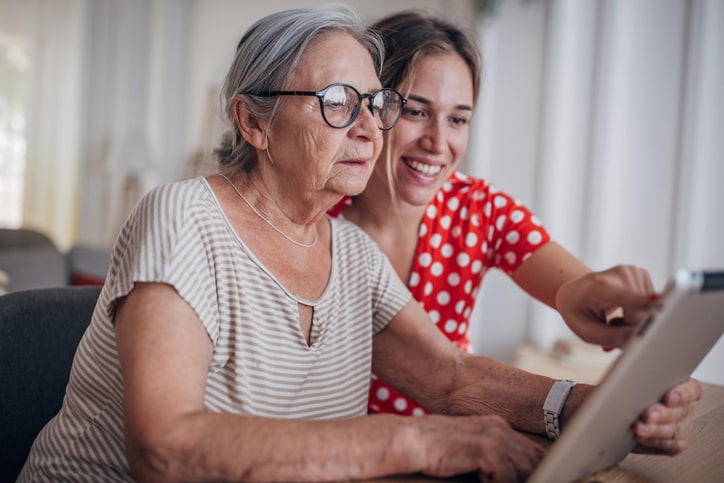In this article
If you’ve experienced sleep deprivation since you started caring for an aging loved one, you’re not alone. Research shows up to 76% of caregivers struggle to get a good night’s rest. Unpaid caregiving has been linked to higher rates of depression and anxiety, which are known to sabotage sleep. On top of stress and mental health struggles, loved ones’ nighttime needs can lead to restless, fragmented slumber.
“This is a common concern because often there’s a fair amount of time when caregivers don’t have enough help,” notes Claudia Wong, a board-certified family nurse practitioner and cognitive care expert at the Pacific Neuroscience Institute at Providence Saint John’s Health Center in Santa Monica, California.
Though common, family senior caregiver sleep deprivation can still be dangerous. Wong says the cumulative effects of lack of sleep can be “very detrimental” to the health of both the caregiver and their aging loved one.
Feel like you’re running on empty? Here, experts weigh in on what causes caregiver sleep issues, signs that your exhaustion might be dangerous and most importantly, how to get help.
Key takeaways
- Caregiver sleep deprivation is common but serious. Up to 76% of family caregivers struggle with sleep due to stress, anxiety, depression, and nighttime caregiving demands and the effects build up over time. Chronic lack of sleep can endanger both the caregiver and their loved one by impairing judgment, mood and attention.
- Severe fatigue can lead to medication errors, unsafe driving, irritability and even aggression, sometimes without the caregiver realizing how impaired they’ve become. Getting fewer than four to five hours of sleep can affect functioning similarly to alcohol impairment.
- Addressing sleep hygiene, using monitoring tools, treating medical causes of nighttime waking and asking for respite or community resources can reduce risk. Caregiving doesn’t have to be done alone, and seeking help protects both caregiver well-being and quality of care.
Why do family caregivers struggle to sleep?
Most causes of caregiver sleep deprivation fall into two main categories, according to Wong:
- Internal disruption. Family caregivers often struggle to fall asleep because of anxiety, depression or stress. Some sleep disturbances, such as sleep apnea, restless leg syndrome and insomnia, are not related to caregiving at all.
- External disruption. Some caregivers cannot stay asleep because their loved one needs help or monitoring through the night.
Internal sleep disturbances
Every family caregiver’s journey is unique. But there’s one thing most unpaid caregivers have in common: high stress. As most caregivers know all too well, there’s a two-way link between stress and sleep. Stress disrupts sleep, and lack of sleep further stresses the body and mind.
In addition, anxiety and depression can also keep people awake at night, notes Wong.
“You’re always being called upon, so you’re waking up multiple times a night. You never get into that deep sleep mode.”
— Jodi B., former family caregiver
External sleep disturbances
Dementia and sleep disorders often go hand in hand. “If it’s someone with dementia, they might have sundowning — hallucinations, paranoia, agitation or wandering around the house at night,” explains Wong. “The risk of falls means the caregivers need to be alert.”
Jodi B., a former family caregiver in northern Indiana, experienced this firsthand while caring for her terminally ill husband. “I was physically and emotionally exhausted,” she recalls. “You’re always being called upon, so you’re waking up multiple times a night. You never get into that deep sleep mode.”
In Jodi’s case, the constant nighttime interruptions led to internal disruptions too. The less sleep she got, the more stressed, irritable and moody she felt throughout the day. She says being overwhelmed and on high alert made it difficult for her to relax and sleep when she had the chance.
How do I know when lack of sleep has become problematic?
The U.S. Department of Health and Human Services recommends that adults get seven to eight hours of sleep each night. While just one sleepless night can impair judgment and physical performance, the mental and physical damage of sleep deprivation is cumulative, according to registered nurse Kathryn A. Lee, who holds her doctorate in nursing.
Lack of sleep is a potentially dangerous situation for the senior and the caregiver, according to Wong. She says sleep deprivation can lead to forgetfulness and inattention — a dangerous combination when medication is involved.
Signs of dangerous sleep deprivation
“Most people should take 5-10 minutes to fall asleep after turning out the light,” says Lee. “Falling asleep as soon as your ‘head hits the pillow’ is a sign of sleep deprivation.” And you could begin suffering from it after just one night without sleep, she notes.
When Jodi suffered from sleep deprivation while caring for her husband, she was too tired to even realize the depths of her exhaustion. “I didn’t make the connection between irritation and sleep deprivation right away,” she says. “People had to point it out to me.”
Here are some other red flags that indicate a caregiver’s sleep deprivation has entered the danger zone, according to the experts we spoke with:
- Excessive daytime sleepiness exhibited by nodding off immediately after sitting down to relax or tune out with a TV show
- Chronic agitation and irritability
- Falling asleep while driving or at stoplights
- Feelings of aggression toward the sick or aging loved one
- Missing or miscalculating medications doses
What are the dangers of caregiving while sleep-deprived?
When you’re a family caregiver, your lack of sleep can have dangerous consequences for your loved one too.
“Studies have shown that getting less than four to five hours of sleep at night is similar to illegally driving under the influence of alcohol,” explains Lee. “You can get so caught up in the daily care needs that you can’t see for yourself how impaired or ‘drunk’ you are.”
Here are some of the dangers of family senior caregiver sleep deprivation:
Medication issues
A caregiver who struggles to concentrate due to sleep deprivation is more likely to forget about or dispense too much medication. About 100,000 hospital deaths each year are due to medication issues like this, according to Wong. If this is an issue in professional medical settings, it is also a risk worth noting at home.
Unsafe driving
In a survey of nearly 150,000 Americans, about 4% admitted to falling asleep at the wheel. This is a potentially fatal danger of sleep deprivation, says Wong. Not to mention: Car accidents are more likely to be deadly for aging seniors, who are often more physically frail.
Relationship troubles
Family caregiving can feel like thankless work. Throw in a lack of sleep and it might feel difficult to be patient or affectionate toward your aging loved one. Unfortunately, the stress can strain relationships at a time when you want to savor your loved one’s presence.
“You try to remain positive and maintain your composure while caring for your loved one, but you’re tired and exhausted,” says Jodi. “It made me feel guilty. I knew that he was seeing my frustration.”
Aggression or abuse
Rarely would a family caregiver set out to abuse an aging loved one. But it does happen. Sleep deprivation can render someone “unable to be resilient in managing the complex nature” of caregiving, according to Wong.
Lee adds, “Getting short-tempered, angry or abusive toward others, particularly your elderly loved one, is a danger sign. If you are losing your patience, don’t be afraid to ask for help and respite care.”
“Caregiving can be both rewarding and one of the most challenging unofficial jobs out there. Don’t give up hope. There are ways to adjust, improve and ask for help.”
— Claudia Wong, board-certified family nurse practitioner
Tips for sleep-deprived family caregivers
For a few family caregivers, mitigating the risk of sleep deprivation could be as simple as using blackout curtains, restricting caffeine and going to bed earlier. But that’s not usually the case.
“Caregiving can be both rewarding and one of the most challenging unofficial jobs out there,” says Wong. “It’s all very cumulative, all these caregiver tasks. It’s very difficult to have one person do it all. Don’t give up hope. There are ways to adjust, improve and ask for help.”
Cover the basics first
There is no substitute for “a good wind-down at the end of the day,” according to Wong. Covering the basics of a sleep-friendly environment and routine could help family caregivers and their aging loved ones sleep more soundly.
A few suggestions for preparing for bedtime:
- Skip caffeine in the evening
- Avoid exposure to blue light from screens in the evening
- Use blackout curtains
- Create a calm atmosphere with soft music, lavender fragrance, and low lights
- Secure the front door and block staircases (if necessary) to mitigate worries about nighttime wandering
Lee says that focusing on the basics of a healthy diet and physical activity during the day helps prime your body for rest at night. Routine exercise, such as a daily walk around the neighborhood, is known to boost sleep quality, according to Dr. Kuljeet K. Gill, sleep medicine and neurophysiology specialist at Northwestern Medicine Central DuPage Hospital in Illinois.
Invest in a monitor
“If you are like most diligent caregivers, you resist taking sleeping medications because you want to be alert and vigilant,” says Lee.
She suggests that placing an audio or video monitor in the senior’s bedroom can help calm your worries about not hearing a disturbance and also help you address restlessness or wandering instances more quickly.
Exhaust your available resources
As an unpaid family caregiver, it’s necessary to ask for help, and it’s important to know when it’s time to ask for it, says Gill.
Wong recommends doing a thorough evaluation of the people and resources around you. Could a neighbor stop by to give you a break? Could you save time by having groceries delivered? Could you ask a friend to do some light housework so that you can take a nap? Or maybe another family member could offer occasional overnight care?
If you have exhausted your personal network, there’s still help available. “Look for resources, senior centers with social workers, someone who is familiar with the resources in the community,” suggests Wong.
Talk to a medical professional
If an aging loved one wakes up multiple times each night despite a sleep-friendly environment, talk to their primary care physician.
Everything from certain medications to a urinary tract infection can disrupt sleep, according to Wong. She says adjusting medication dosage can sometimes help, as can treating underlying medical issues such as infections or sleep apnea.
While at the appointment, don’t hesitate to reach out for general help, says Wong. A senior care facility or hospital is an excellent place to request information about caregiver resources in your area.





